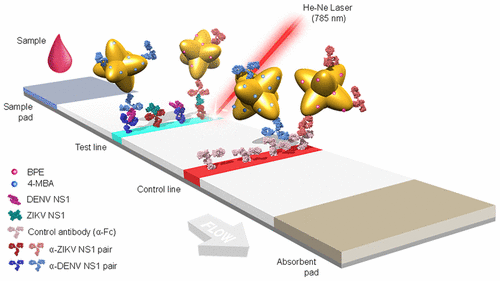当前位置:
X-MOL 学术
›
ACS Infect. Dis.
›
论文详情
Our official English website, www.x-mol.net, welcomes your
feedback! (Note: you will need to create a separate account there.)
Surface-Enhanced Raman Spectroscopy-Based Sandwich Immunoassays for Multiplexed Detection of Zika and Dengue Viral Biomarkers.
ACS Infectious Diseases ( IF 4.0 ) Pub Date : 2017-09-06 , DOI: 10.1021/acsinfecdis.7b00110 Maria Sánchez-Purrà 1 , Marc Carré-Camps 2 , Helena de Puig , Irene Bosch , Lee Gehrke 3 , Kimberly Hamad-Schifferli 1
ACS Infectious Diseases ( IF 4.0 ) Pub Date : 2017-09-06 , DOI: 10.1021/acsinfecdis.7b00110 Maria Sánchez-Purrà 1 , Marc Carré-Camps 2 , Helena de Puig , Irene Bosch , Lee Gehrke 3 , Kimberly Hamad-Schifferli 1
Affiliation

|
Zika and dengue are mosquito-borne diseases that present similar nonspecific symptoms but possess dramatically different outcomes. The first line of defense in epidemic outbreaks are rapid point-of-care diagnostics. Because many outbreaks occur in areas that are resource poor, assays that are easy to use, inexpensive, and require no power have become invaluable in patient treatment, quarantining, and surveillance. Paper-based sandwich immunoassays such as lateral flow assays (LFAs) are attractive as point-of-care solutions as they have the potential for wider deployability than lab-based assays such as PCR. However, their low sensitivity imposes limitations on their ability to detect low biomarker levels and early diagnosis. Here, we exploit the high sensitivity of surface-enhanced Raman spectroscopy (SERS) in a multiplexed assay that can distinguish between Zika and dengue nonstructural protein 1 (NS1) biomarkers. SERS-encoded gold nanostars were conjugated to specific antibodies for both diseases and used in a dipstick immunoassay, which exhibited 15-fold and 7-fold lower detection limits for Zika NS1 and dengue NS1, respectively. This platform combines the simplicity of a LFA with the high sensitivity of SERS and could not only improve Zika diagnosis but also detect diseases sooner after infection when biomarker levels are low.
中文翻译:

基于表面增强拉曼光谱的夹心免疫分析,用于多重检测寨卡病毒和登革热病毒生物标志物。
寨卡病毒和登革热是由蚊子传播的疾病,它们表现出相似的非特异性症状,但结果却截然不同。流行病爆发的第一道防线是快速的护理点诊断。由于许多疫情爆发发生在资源匮乏的地区,因此易于使用、价格低廉且无需电源的检测方法在患者治疗、隔离和监测中变得非常宝贵。纸质夹心免疫测定(例如侧流测定 (LFA))作为现场护理解决方案很有吸引力,因为它们比基于实验室的测定(例如 PCR)具有更广泛的部署潜力。然而,它们的低敏感性限制了它们检测低生物标志物水平和早期诊断的能力。在这里,我们在多重检测中利用表面增强拉曼光谱 (SERS) 的高灵敏度,可以区分寨卡病毒和登革热非结构蛋白 1 (NS1) 生物标志物。 SERS 编码的金纳米星与这两种疾病的特异性抗体缀合,并用于试纸免疫测定,其对寨卡 NS1 和登革热 NS1 的检测限分别降低了 15 倍和 7 倍。该平台结合了 LFA 的简单性和 SERS 的高灵敏度,不仅可以改善寨卡病毒的诊断,而且可以在感染后生物标志物水平较低时更快地检测到疾病。
更新日期:2017-09-06
中文翻译:

基于表面增强拉曼光谱的夹心免疫分析,用于多重检测寨卡病毒和登革热病毒生物标志物。
寨卡病毒和登革热是由蚊子传播的疾病,它们表现出相似的非特异性症状,但结果却截然不同。流行病爆发的第一道防线是快速的护理点诊断。由于许多疫情爆发发生在资源匮乏的地区,因此易于使用、价格低廉且无需电源的检测方法在患者治疗、隔离和监测中变得非常宝贵。纸质夹心免疫测定(例如侧流测定 (LFA))作为现场护理解决方案很有吸引力,因为它们比基于实验室的测定(例如 PCR)具有更广泛的部署潜力。然而,它们的低敏感性限制了它们检测低生物标志物水平和早期诊断的能力。在这里,我们在多重检测中利用表面增强拉曼光谱 (SERS) 的高灵敏度,可以区分寨卡病毒和登革热非结构蛋白 1 (NS1) 生物标志物。 SERS 编码的金纳米星与这两种疾病的特异性抗体缀合,并用于试纸免疫测定,其对寨卡 NS1 和登革热 NS1 的检测限分别降低了 15 倍和 7 倍。该平台结合了 LFA 的简单性和 SERS 的高灵敏度,不仅可以改善寨卡病毒的诊断,而且可以在感染后生物标志物水平较低时更快地检测到疾病。











































 京公网安备 11010802027423号
京公网安备 11010802027423号